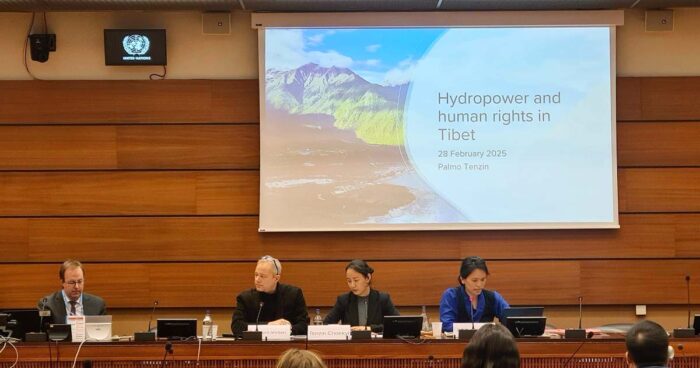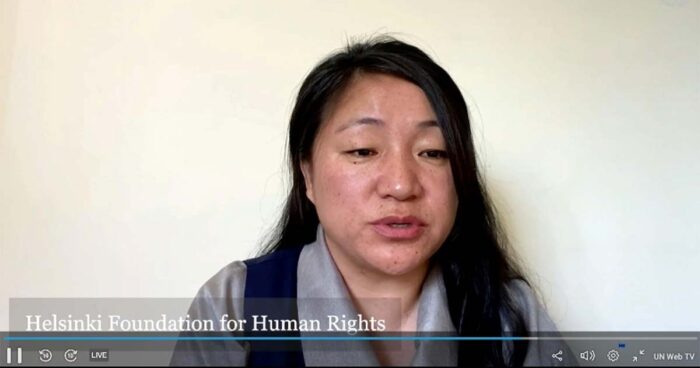During the 58th session of the United Nations Human Rights Council, Tibetan rights advocates vocally raised the systematic rights violations of the Chinese Communist Party in Tibet.
Most prominently, a side-event in the Palais des Nations in Geneva which houses the Human Rights Council, highlighted the devastating impact of Chinese hydropower projects in Tibet. Hosted by the Helsinki Foundation for Human Rights, the event featured a presentation by ICT Senior Researcher Palmo Tenzin. Tenzin summarized the findings of the recent ICT report “Damning Tibet”, and Tibet Watch Senior Researcher Tenzin Choekyi spoke to the Tibetan people’s nonviolent protest of these projects on the ground. Dechen Palmo from Tibet Policy Institute, based in Dharamshala, India, provided a statement underscoring the significant regional security implications of China’s hydropower construction on Tibet’s rivers. The event, moderated by ICT’s EU Policy Director Vincent Metten, was attended by a number of diplomatic missions and civil society representatives. Notably, the Chinese mission to Geneva felt compelled to take the floor in response to the panel, recycling the standard CCP propaganda script.

Earlier during the session, ICT echoed recent criticism by the UN High Commissioner for Human Rights, Volker Türk, regarding the human rights situation in Tibet. In his Global Update before the UN Human Rights Council in Geneva on 3 March, Türk expressed that he is “concerned about the impact of education policy and the restriction of freedom of expression and religion in the Tibet Autonomous Region.” Türk committed to continue raising these issues in his ongoing discussions with the Chinese government.
In two statements at the plenary of the Human Rights Council, Kai Mueller, Executive Director of ICT Germany, and Sangmo Tenzin, ICT Field Researcher in Dharamsala, raised the assault on cultural rights in Tibet and China’s mishandling of the devastating earthquake. Tenzin stated on behalf of the Helsinki Foundation for Human Rights:
“Even after a major natural disaster, China has sealed off Tibet. No international journalists have reported from the site and no humanitarian organisations have been able to visit and provide assistance. We don’t know the true scale of the damage, whether aid is reaching those in need, or whether reconstruction will respect and integrate Tibetan community’s needs.” Tenzin then urged “the international community to demand immediate and unhindered access to Tibet. States have a responsibility to raise individual cases of persecution as well as policies that are erasing the Tibetan civilization.”

At another side-event organized by the Society for Threatened Peoples, Representative Thinlay Chukki from the Office of Tibet in Geneva presented the overall human rights situation in Tibet. Chukki raised the forced expulsion of thousands of Tibetans for the construction of dams, the consequences of Chinese coercive boarding schools for Tibetan children, the ban on religious activities and the slander of the Dalai Lama. She also recalled the disappearance of the Panchen Lama, who was kidnapped by the Chinese government 30 years ago at the age of six together with his family.
States raise Tibet at General Debate
On 20 March, at the General Debate of the Human Rights Council, several delegations raised the human rights situation in Tibet. A group statement by 28 European states (all EU member states excluding Hungary, but joined by Liechtenstein and Montenegro), delivered by Poland, read “The human rights situation in Tibet continues to be dire. Indicators of this include obligatory boarding schooling and the suppression of protests against hydropower projects. We are deeply concerned over reports that Tibetan schools teaching Tibetan language and culture have been shut down and that Chinese authorities have insisted that all students attend state schools where Tibetan is only taught as a stand-alone subject.” The statement also called for the immediate and unconditional release of the Tibetans Anya Sengdra, Chadrel Rinpoche, Go Sherab Gyatso, Golog Palden, Semkyi Dolma and Tashi Dorje.
Germany, in its statement, particularly highlighted the intervention of the Chinese state into the appointment of Tibetan Buddhist leaders, stating “We condemn continuing violations of civil and political rights, including in the Xinjiang Autonomous Region, the Tibet Autonomous Region and the Hong Kong Special Administrative Region. We call on China to respect freedom of religion and belief. Religious communities must be allowed to choose their leaders without interference.”
The Czech Republic stated: “Czechia condemns the continuing human rights violations in China, such as arbitrary detentions, forced labour, torture, gender-based violence and denial of cultural rights, especially in Xinjiang and Tibet. We urge China to end the discrimination and mistreatment of ethnic, religious and linguistic minorities and reiterate our call on China to implement the recommendations of the 2022 OHCHR human rights’ assessment.”
In addition to these statements, Finland, Denmark, Ireland, Japan, Lithuania, the Netherlands, Switzerland and the UK raised the human rights situation in Tibet.
ICT President Tencho Gyatso stated, “Tibetans are at the forefront of defending universal values in an increasingly autocratic world. Their struggle is thus not theirs alone, but the struggle shared by all freedom loving people. The United Nations is a battleground between autocracy and justice. At the UN, Tibetan advocates speak truth to power while they challenge autocracy and dictatorship. They deserve undivided support.”